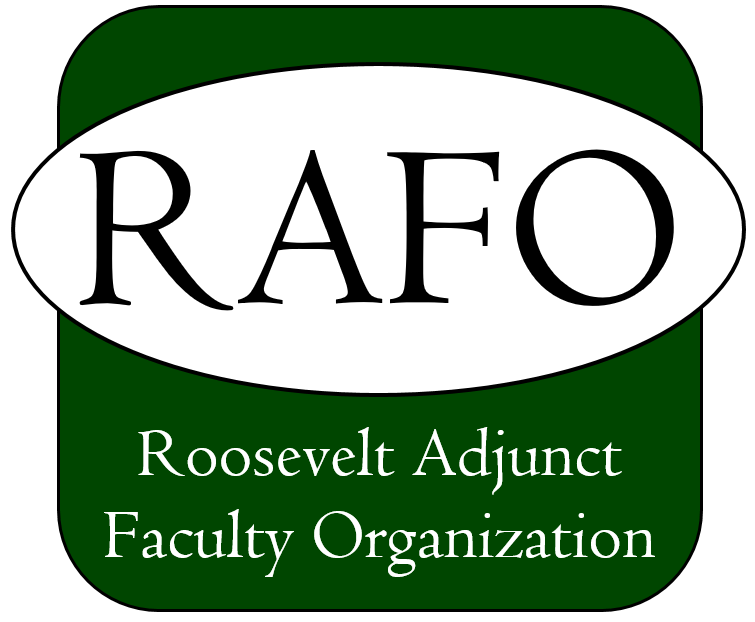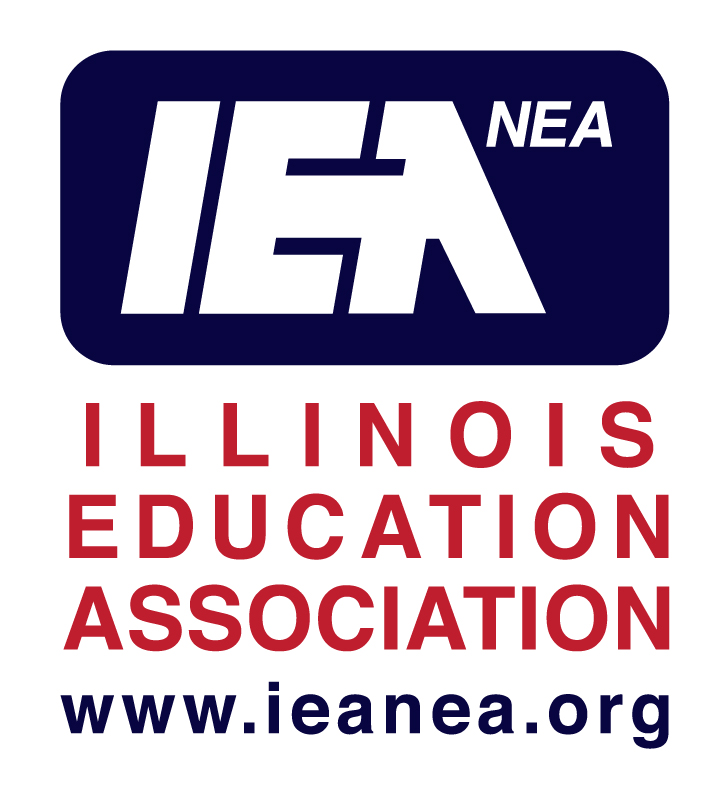From Joseph Fedorko
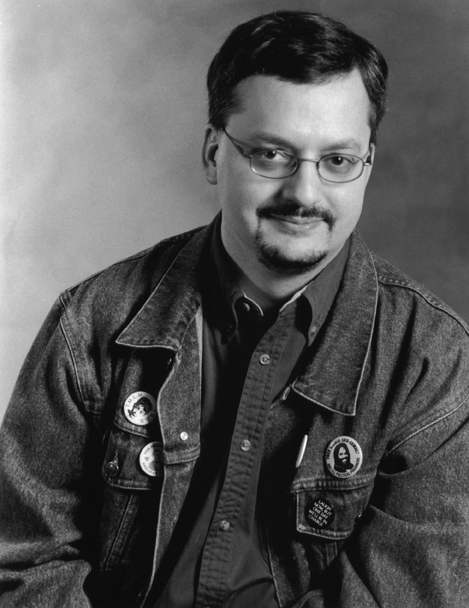 One doesn’t plan on becoming an adjunct. One certainly doesn’t create a career around becoming an adjunct. You either do it as a side job, as a stepping stone to something bigger, or as a piece to a larger puzzle of other kinds of work you want to do.
One doesn’t plan on becoming an adjunct. One certainly doesn’t create a career around becoming an adjunct. You either do it as a side job, as a stepping stone to something bigger, or as a piece to a larger puzzle of other kinds of work you want to do.
At least that’s what Joe Fedorko was thinking when, after finishing a Masters’ Degree at Northwestern only to find his doctoral project proposal rejected by a new dean in their theatre program, he accepted a course from the late Priscilla Davidson to try his hand at teaching English composition – something he wasn’t formally trained to do, but something he calculated he could, after 15 years of English classes, be able to figure out. That class was in 1990, and thirty years later, Joe’s still teaching, still adjuncting, still figuring out how to teach English composition, and still at Roosevelt.
If the above sounds kind of sad, it isn’t. Joe approached both the teaching and the adjuncting with a clear head. He never earned a Ph.D. (though he came close to finishing an MFA before writers’ block and becoming an active part of RAFO emerged), but Joe wound up using the teaching as a base to build a freelance writing practice, which in the 1990s was quite busy and lucrative. Working on industrial training videos, grant writing and fundraising, and riding the bubble of the creation of the Internet, Joe could nurture his teaching skills through evening courses (which in those days was the majority of courses at Roosevelt) and make a comfortable living, all while also pursuing his playwriting through his residency at Chicago Dramatists. Teaching was part of the mix, but not central to his career tracks.
That changed in April 2001, when the dot-com bubble burst and the boom of the Internet gave way to the unease of George W. Bush and 9/11. That was when the opportunity to teach not one but two (two?!) classes at RU emerged, as well as getting courses at nearby Columbia College Chicago. The timing was helpful – Columbia had become the first group of adjuncts in Chicago who organized into a union, with Roosevelt soon following. By 2004, Joe had stepped up to become RAFO’s department representative for the Composition program, and his work at Columbia had shifted from English composition to public speaking, which gave him a chance to use his experience as a debate coach in Ohio and his still-active playwriting work to teach what Columbia called “oral expression.”
All the while, Joe ‘climbed’ the leadership ladder within RAFO. The son of a U.S. Steel career man who became a foreman in the shipping and receiving division, Joe was surrounded growing up by uncles in a variety of unions – AFL-CIO, Teamsters/City of Cleveland, UAW, USW, UMW. Joe’s beloved godmother was a union butcher in Cleveland, and his brother’s godfather was one of the lead negotiators in Berea, OH’s Chevrolet plant. Never did he think that he would fall into the proud tradition of his uncles by being a proud card-carrying member of a union. As proud and card-carrying as he is, he realizes the obligation to pay back for folks whose paths may have made them stumble into adjuncting. The paths are different, but the need to help folks while on that path is important.
 Now, thirty years later, Joe’s still at RU. He’s still working. He’s still writing plays, having formed his own theater, turned podcasting, company (DB Comedy) in 2006; still at Columbia; still freelancing (Joe now does private speech coaching and writing!); and he is still trying to figure out what he’ll do with his life once this adjuncting thing is done.
Now, thirty years later, Joe’s still at RU. He’s still working. He’s still writing plays, having formed his own theater, turned podcasting, company (DB Comedy) in 2006; still at Columbia; still freelancing (Joe now does private speech coaching and writing!); and he is still trying to figure out what he’ll do with his life once this adjuncting thing is done.
Thirty years just happens. Sometimes adjuncting does, too. And if Joe is any indication, while you may not get rich adjuncting, you can still use it to help figure out what you’ll do next.
From Beverly Stewart, Region 67 Grassroots Political Activist
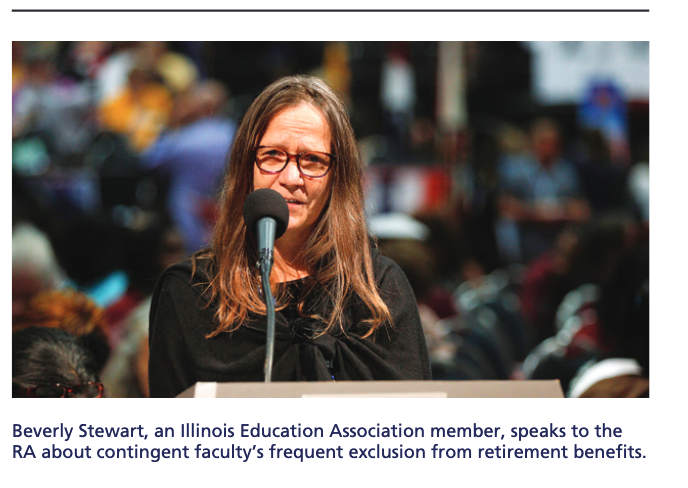
After working 17 years on the Higher Education Council for the Illinois Education Association (IEA), the state of higher education has improved and has remained the same, especially for contingent faculty. Most full-time community college units have 100 percent membership and are fairly self-contained.
The improvements we made within the structure of our state and national unions include
- Winning four internal organizing grants from the National Education Association (NEA) to pay members to sign up former agency fee payers. Agency-fee or fair share members pay dues even if they never signed membership cards because in Illinois locals that negotiated for a closed shop, meaning membership was a condition of hire, had dues taken out automatically. After the Supreme Court in the Janus decision ruled that public sector employee could not negotiate closed shops, our contingent locals lost a lot of members. Over two summers, the College of DuPage Adjuncts Association has signed more than 100 members; since the beginning of the semester, Chicago City Colleges Contingent Labor Organizing Committee has signed more than 80, and Harper College Adjunct Faculty Association is just beginning. Illinois State University Faculty Association (ISUFA) has signed more than a dozen, but has identified members who are becoming active in the local by joining the rep system and the negotiations team.
- Getting an organizer to work with higher education, for three years, who wrote the grants and now trains and works with the local member organizer initiatives.
- Winning a higher educator of the year award by the NEA and IEA. The first in Illinois will be named at the Representative Assembly in March.
- Winning quarter-time dues for all contingent faculty in Illinois. Before last year, nontenure track faculty at Illinois State University, paid full or half dues depending on their work loads, but they did not enjoy equivalent salaries or benefit full professors earned.
- Winning a permanent seat on the IEA’s executive committee. The executive committee includes 10 board members, who are elected each year by the board members, and it includes the executive officers.
- Establishing Region 67 in Chicago and Service area H in Edwardsville (near St Louis) , which include only higher ed locals. These two regions at least allows higher ed locals to interact with each other with the hope of developing collaborative projects.
We continue to fight for contingent faculty to automatically win unemployment benefits between semesters.
Our greatest challenge in Illinois is funding. Since 2000, the state’s contribution to public higher education dropped 50 percent by 2015. For two years, the state budget included nothing or next to nothing for higher education. This year the state increased funding to just below 2015 levels and increased the student Monetary Awards Program (MAP) grants.
As the IEA supports the fair tax initiative, which amends the state constitution’s flat income tax provision to be a progressive tax, we need to talk to our legislators now. As the current Grassroots Political Activist for Region 67, I will be asking some of you to join me in educating about the need for adequate funding for higher education.
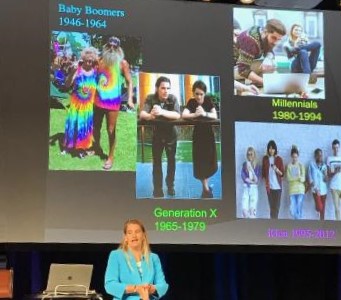 RAFO sponsored three adjunct faculty members to attend the Writing on the Edge 2019 Conference held on September 21 at the College of DuPage. The conference theme was “iGen: Reaching the Smartphone Generation in the Classroom.” The term iGen refers to the first generation spending their adolescence with smartphones. It is important to note that new strategies and new ways to engage this unique generation must be created.
RAFO sponsored three adjunct faculty members to attend the Writing on the Edge 2019 Conference held on September 21 at the College of DuPage. The conference theme was “iGen: Reaching the Smartphone Generation in the Classroom.” The term iGen refers to the first generation spending their adolescence with smartphones. It is important to note that new strategies and new ways to engage this unique generation must be created.
Jennifer Wilson (RAFO president), Joe Fedorko (RAFO membership chair), and Ami Hicks (RAFO professional development chair) were able to attend this conference. Dr. Jean Twenge professor of Psychology at San Diego State University was the Keynote Speaker and talked about “why today’s Super-Connected Kids are growing up Less Happy and Completely Unprepared for Adulthood” (see p. 5 COD WOTE 2019 brochure).
Jennifer Wilson presented “The Anxiety Epidemic: Five Tactics for Addressing Students’ Stress.” She discussed how alarming it is that college students experience chronic and episodic stress and offered five suggestions to help students manage their coursework and stress levels. She will be presenting this topic at RAFO’s upcoming Adjunct to Adjunct Conference in April 2020.
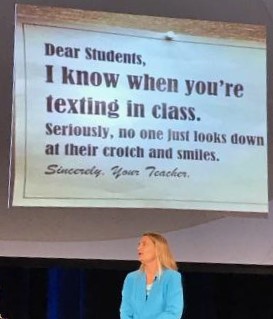 The executive committee encourages all adjunct faculty to participate in these professional development conferences and offers to pay the registration fee for those who would like to be more involved in their own professional growth. RAFO also encourages all adjunct faculty to present and share their knowledge and skills with other adjunct faculty. There will be additional opportunities to present and become involved in the upcoming Adjunct to Adjunct Conference in April 2020.
The executive committee encourages all adjunct faculty to participate in these professional development conferences and offers to pay the registration fee for those who would like to be more involved in their own professional growth. RAFO also encourages all adjunct faculty to present and share their knowledge and skills with other adjunct faculty. There will be additional opportunities to present and become involved in the upcoming Adjunct to Adjunct Conference in April 2020.
Our Roosevelt AAUP Chapter is inviting Hank Reichman, Ph.D. to campus on Tuesday Oct. 15 from 11:30am-12:30pm in AUD 309 / SCH 614 to speak on the topic “The Future of Academic Freedom,” which could also be subtitled “Can I tweet that?” All are welcome to attend.
https://sites.google.com/site/aauporganizingforchange/hank-reichman-bio
There will even be a limited supply of free copies of Dr. Reichman's book:
https://pwb02mw.press.jhu.edu/title/future-academic-freedom
For more info. contact Prof. Ken Mihavics.
Join Zoom Meeting
https://roosevelt.zoom.us/j/991612091
We received exciting news today! Roosevelt will be merging with nearby Robert Morris. RAFO will provide further information on how this will affect us in the coming weeks.
News Release from Roosevelt University
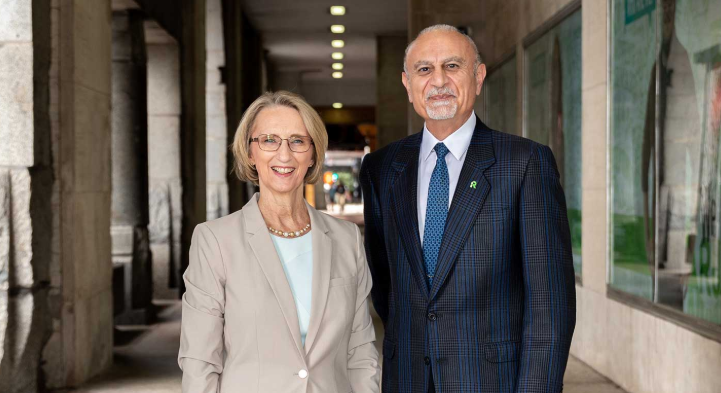
Roosevelt University president, Ali Malekzadeh, and Robert Morris University Illinois president, Mablene Krueger, announced that Roosevelt has submitted an application to the Higher Learning Commission (HLC) to make Robert Morris University Illinois a part of Roosevelt. The combined universities would continue under the name of Roosevelt University. The joining of the two universities would help them build on their historic missions that honor diversity, inclusion and access to education for all.
“We have been working with Robert Morris’ leadership team to ensure that it is a good fit for our respective students, faculty and staff,” said Malekzadeh. “Because of our complementary programs, and inclusive, yet distinct, missions of social justice and social equity, it is a perfect fit for both our universities’ students, faculty and staff. This partnership provides countless opportunities for everyone. We hope for this to be a model approach on how to successfully integrate two private universities.”
The newly expanded Roosevelt would continue to be nationally recognized as a catalyst for students from all walks of life to receive transformational learning experiences, preparing students to become socially conscious citizens who thrive in a diverse and changing world.
Subcategories
Contracts
RAFO Members:
As lead negotiator for the 2020-2024 contract, I am pleased to announce that your negotiating team and Roosevelt University have come to an agreement. RAFO is extremely pleased with the final outcome and we believe you will be, too. The University was adamant on 0% for the first year, but as an offset for that 0%, we negotiated a signing bonus of $150 for each bargaining unit member that taught either in Spring 2020 or will teach in the upcoming Fall 2020 semester. That then takes us into the final three years of the contract where adjuncts will receive a 2% increase for each of those years.
As I hope you can see from the above, RAFO worked hard to ensure that you are rewarded for the professionalism and integrity all have shown during these unusual and trying times. We are attaching a copy of the final contract for you to review and eventually ratify. The areas that appear in green are changes that were made to the verbiage in the contract that will support RAFO during the upcoming 4 years. Appendix A reflects the 2% increase for each step in the final three years.
A link with the time will be sent next week for all to join this a zoom meeting, where we can answer your questions about the contract.
In closing, we hope you will be as excited as we are regarding the new contract.
In solidarity,
Don Wlodarski and the RAFO team:
Jen Wilson, Joseph Fedorko, Amelia Hicks, Stan Traywick, Mike Pinsoff and Dennis Tucker
Page 17 of 32
